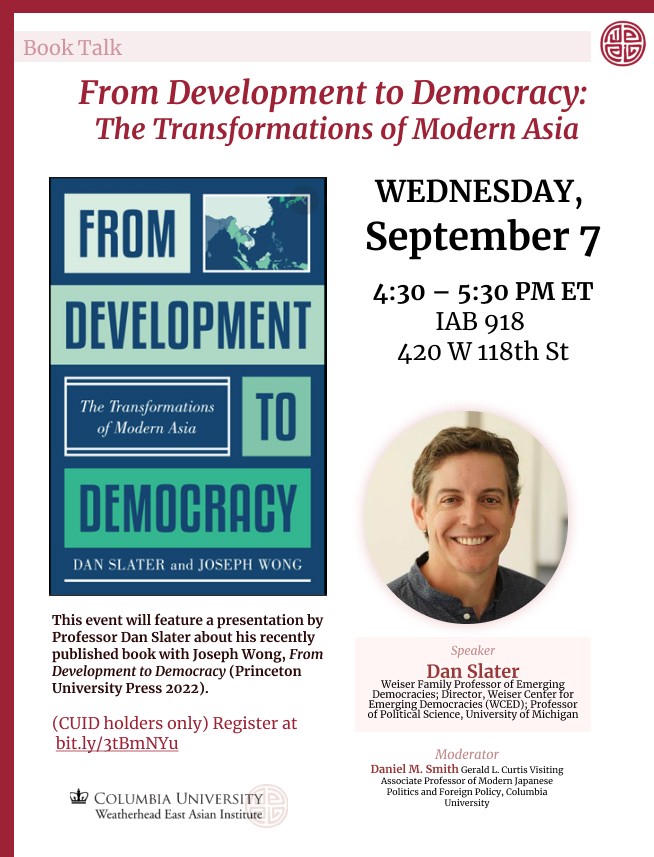Watch the recorded event here.
Registration:
- To attend this event in-person, please register HERE. *CU ID holders only
Speaker: Dan Slater, Weiser Family Professor of Emerging Democracies; Director, Weiser Center for Emerging Democracies (WCED); Professor of Political Science, University of Michigan
Moderator: Daniel M. Smith, Gerald L. Curtis Visiting Associate Professor of Modern Japanese Politics and Foreign Policy, Columbia University
This event will feature a presentation by Professor Dan Slater about his recently published book with Joseph Wong, From Development to Democracy (Princeton University Press 2022).
Over the past century, Asia has been transformed by rapid economic growth, industrialization, and urbanization—a spectacular record of development that has turned one of the world’s poorest regions into one of its richest. Yet Asia’s record of democratization has been much more uneven, despite the global correlation between development and democracy. Why have some Asian countries become more democratic as they have grown richer, while others—most notably China—haven’t?
Slater and Wong demonstrate that Asia defies the conventional expectation that authoritarian regimes concede democratization only as a last resort, during times of weakness. Instead, Asian dictators have pursued democratic reforms as a proactive strategy to revitalize their power from a position of strength. Of central importance is whether authoritarians are confident of victory and stability. In Japan, South Korea, and Taiwan these factors fostered democracy through strength, while democratic experiments in Indonesia, Thailand, and Myanmar were less successful and more reversible. At the same time, resistance to democratic reforms has proven intractable in Singapore, Malaysia, Hong Kong, China, Vietnam, and Cambodia. Reconsidering China’s 1989 crackdown, Slater and Wong argue that it was the action of a regime too weak to concede, not too strong to fail, and they explain why China can allow democracy without inviting instability.
The result is a comprehensive regional history that offers important new insights about when and how democratic transitions happen—and what the future of Asia might be.
Speaker Bio: Dan Slater is the Weiser Family Professor of Emerging Democracies in the Department of Political Science and Director of the Weiser Center for Emerging Democracies (WCED) at the University of Michigan. He specializes in the politics and history of democracy and authoritarianism, with a regional focus on Southeast Asia. His books include From Development to Democracy: The Transformations of Modern Asia (Princeton 2022, with Joseph Wong); Coercive Distribution (Cambridge 2018, with Michael Albertus and Sofia Fenner); and Ordering Power: Contentious Politics and Authoritarian Leviathans in Southeast Asia (Cambridge 2010). His published articles can be found in disciplinary journals such as the American Journal of Political Science, American Journal of Sociology, Annual Review of Political Science, British Journal of Political Science, Comparative Politics, Comparative Political Studies, International Organization, Government & Opposition, Journal of Democracy, Perspectives on Politics, Studies in Comparative International Development, and World Politics. He has recently served as a consultant and nonresidential fellow at Freedom House, the American Enterprise Institute, and the Carnegie Endowment for International Peace.
This event is sponsored by the Weatherhead East Asian Institute.

